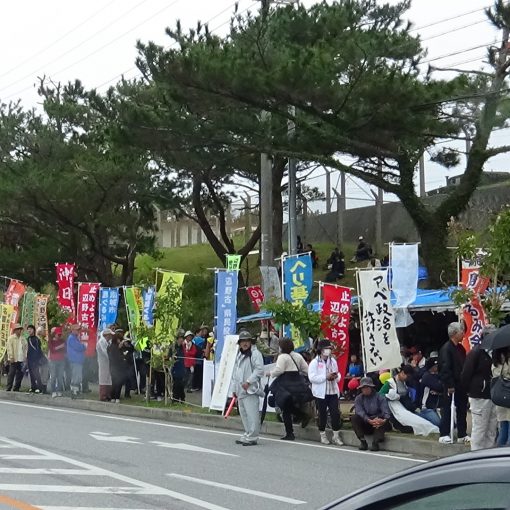March 16 2021 Ryukyu Shimpo
We must take full advantage of this letter. The Overseas Base Realignment and Closure Coalition, a group of U.S. intellectuals, former officials, and others, published a letter addressed to President Biden calling for closure of U.S. military bases overseas. The signatories have taken issue with the new base construction in Henoko, Nago and the excessive burden of bases in Okinawa.
The letter takes issue with the increased military tensions and environmental destruction caused by U.S. bases overseas. It asserts that closure of overseas bases will reduce the fiscal burden on the U.S. and contribute to the domestic economy.
For Okinawa, suffering under an excessive burden of bases, these views and perspectives are highly important. Solidarity with this movement will surely lead to new initiatives aimed at stopping the new base construction in Henoko and reducing the burden of bases. We hope to see the Okinawa prefectural government, which opposes the new base, take this letter as an opportunity for renewed international solidarity.
This recommendation follows a previous one in 2018. They have come against a backdrop of reduced budgets for domestic education and social services for the sake of massive spending on building and maintaining bases overseas. U.S. bases also serve to increase tensions with China, Russia, and other neighboring countries.
Representatives of the Quincy Institute, a think tank established with funding from two wealthy donors, also signed on to the letter. The two donors were George Soros, a well-known liberal, and Charles Koch, a libertarian who supports “small government” and renounces military intervention overseas, the two having opposing political views. The institute emphasizes this moment as a “once-in-a-generation opportunity to bring together like-minded progressives and conservatives”.
Despite their divergent beliefs, the two agree that the U.S. should engage in restrained exercise of military force, stop “endless wars” in the Middle East and alter its diplomatic policy.
In fact, the U.S. has reduced the number of military bases it has overseas. The more than 2,000 overseas U.S. military facilities that existed in 1945 were reduced after the Vietnam War and after the Cold War, and now stand at around 800.
U.S. bases in Japan, however, mostly tend not to be subject to reduction. This is because Japan pays a high proportion of the costs required to station U.S. troops. The cost paid by Japan for U.S. forces stationed in Japan (the so-called “omoiyari yosan (sympathy budget)”) reached 201.7 billion JPY per year in fiscal 2021. The massive costs paid by the Japanese government are well appreciated by the U.S. military, and serve as an obstacle to closure and downsizing of the U.S. military bases in Okinawa and other parts of Japan.
The budget for building and maintaining military bases is huge for Japan as well. Japan’s defense budget reaches 5 trillion and some hundred billion JPY per year. According to the Okinawa prefectural government’s estimate, the cost for the new base in Henoko will be 550 billion JPY. The government has been spending some 26 million JPY per day for security in relation to the new base construction. Of the total construction cost of 930 billion JPY presented by the national government, roughly 170 billion, or around 18%, is associated with security costs, an amount equal to the cost of one Maya-class destroyer. This budget allocation can only be said to be absurd.
Moreover, the world is now facing an unprecedented pandemic with Covid-19. Now, with huge costs required for infection prevention and economic measures, is not the time to be spending massive amounts of taxes on military bases that will provoke other countries and raise tensions. We must escape from this negative spiral in which the more weapons are developed and deployed, the more other countries react, leading to an arms race. We should shift to a diplomatic policy emphasizing dialogue requiring no military cost.
(English translation by T&CT and Sandi Aritza)



